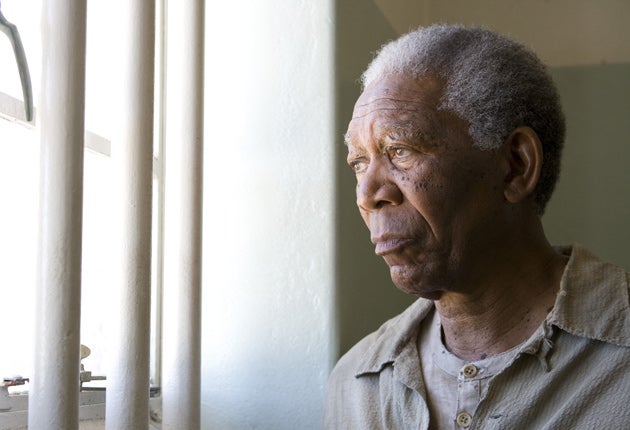Invictus, Clint Eastwood, 134 mins (12A)
Mandela is the inspiring coach in a beating-the-odds sports tale

One of the last images we see in Clint Eastwood's new film is a trophy – the Rugby World Cup, to be precise – and Invictus is nothing if not a trophy film.
A prestige production, noble in heart and mind, Invictus is utterly ponderous, as three out of four Eastwood films are these days. But I'll give it this, Invictus is something you wouldn't easily have predicted: a Clint Eastwood film about Nelson Mandela's part in South Africa's international rugby triumph of 1995.
Based on John Carlin's book Playing the Enemy, the film is about Mandela's unlikely support of the Springboks – an almost entirely white team beloved of Afrikaners and therefore long identified, for black South Africans, with the apartheid regime. Mandela cannily realises that to back the Springboks is his best bet: he'll avoid alienating whites and will unite the nation under one sporting flag. So he devotes himself to taking a fatherly interest in the beleaguered team under captain François Pienaar (Matt Damon).
Exactly what else Mandela was doing in the first five years of his presidency is uncertain: at one point, he undertakes a world tour, including an appearance at the United Nations, but the film suggests this is essentially a distraction from the important business of sports patronage. Backing the Boks, Mandela explains, is "not a political calculation ... but a human calculation".
Yet it's also a move by a politician with a canny grip of PR: "A billion people watching us? This is a great opportunity." This is where the film makes sense in terms of Eastwood's interests: morale-raising PR is a topic he addressed in Flags of Our Fathers (2006), about the United States' wartime use of the photo of Marines raising the Stars and Stripes on Iwo Jima. But that was a bracingly sceptical film, Invictus is hamstrung by its tone of standing-and-saluting awe.
Invictus celebrates the figure of the political leader as sage – someone whose insights surpass those of his fellows, someone who can be autocratic but gently so, guiding with a firm grip but brooking no question. You suspect, in this admiring picture of the quiet man who simply knows better, that Eastwood is also subliminally painting an idealised portrait of himself as director.
"He's not a saint, he's a man with a man's problems," one of Mandela's bodyguards comments. Yet the film gives us less of the man, more of the icon. The sound mix has a way of making his voice resound as if he's addressing a stadium, even if he's only talking in a small meeting hall. That's hardly surprising, given that Mandela is played by the magnificently resonant Morgan Freeman. The actor's Oscar-nominated performance has a weary, tender loftiness that's certainly imposing – yet you can't help feeling that, rather than Mandela, Freeman is essentially playing himself, one of cinema's reigning embodiments of gravitas. When we see a still of the real Mandela during the end credits, his grin reminds you of the exuberance so vital to his political charisma. It takes Freeman till the end of the film to crack a full grin: for the most part, he's wry at best.
A bulked-up Damon gives the film some no-nonsense solidity, playing a man unsure whether he's equal to carrying the weight of history on his shoulders – even a rugby player's shoulders. The best moments are his: at home with a father whose apartheid habits are hard to break, and in the changing room where the Springboks, on a losing streak, petulantly sling their beer cans at the wall.
But apart from the stirringly shot climactic showdown with New Zealand's All Blacks, Invictus is pious and dramatically inert. In the end it's not so much a film about South Africa, more an addition to the endless roll of movies about an underdog sports team beating the odds, thanks to an outsider with inspiring vision. You could easily come away thinking that Mandela's single most important contribution to his nation was to encourage a team on the skids to pull up its socks and surge to Cup victory. In the logic of the Hollywood sports movie, the Springboks probably didn't need as illustrious a guru as Nelson Mandela for that – Sandra Bullock would surely have sufficed.

Watch Apple TV+ free for 7 day
New subscribers only. £8.99/mo. after free trial. Plan auto-renews until cancelled.
ADVERTISEMENT. If you sign up to this service we will earn commission. This revenue helps to fund journalism across The Independent.

Watch Apple TV+ free for 7 day
New subscribers only. £8.99/mo. after free trial. Plan auto-renews until cancelled.
ADVERTISEMENT. If you sign up to this service we will earn commission. This revenue helps to fund journalism across The Independent.
Next Week:
Jonathan Romney gets the measure of 'A Single Man', the debut film by fashion designer Tom Ford. Will it be a perfect fit or a stitch-up?
Join our commenting forum
Join thought-provoking conversations, follow other Independent readers and see their replies
Comments